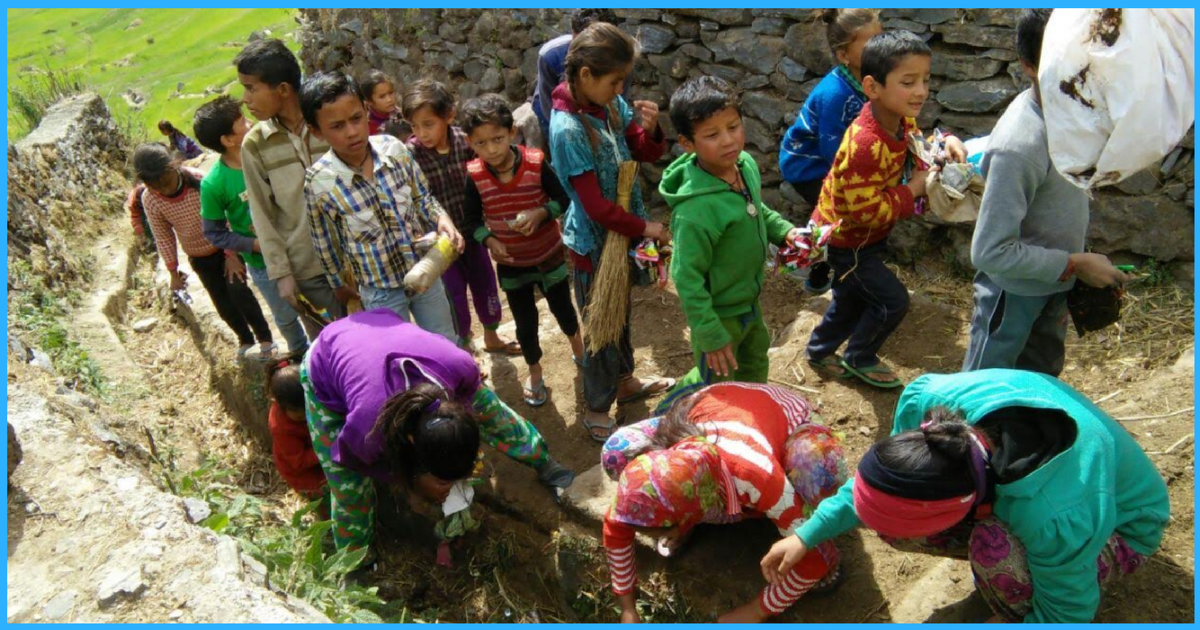
These 35 Children Went Door To Door For A Survey And Cleaned Their Village In Uttarakhand
 |
|We are often bothered by the state of hygiene and cleanliness around us. We complain, we scream but how many of us have taken it upon ourselves to bring about a change? Have we bothered to do something toward the betterment of the situation? Feisty 15-year-old Manisha Bisht and her group of 35 children have made a clean sweep of their village, thus taking the onus upon themselves.
The initiative
Bisht and her children have won the hearts and minds of the 200-odd villagers of their remote mountain community by taking the preservation of its natural beauty into their own hands. They have cleared it of garbage and are making plans to keep it that way.
The children, all between the ages of 10 and 18, live in Luntara, nestled 6551 feet above sea level in the Chamoli district of Uttarakhand. They are all concerned about the future of their native place and their own destinies if they don’t take action now. They are concerned about their fate and the situation that might arise in a few years. This prompted them to take immediate action and ensure a better future, for themselves and their entire community.

The remoteness of the region often means a lack of access to basic resources and opportunities, this implies a heightened vulnerability to natural disasters caused by practices such as deforestation which are environmentally unsustainable and often lead to natural disasters like landslides.
Mountain Children’s Foundation
Mountain Children’s Foundation (MCF), is a local not-for-profit organisation that helped create Luntara’s hub for collective action. This organisation aims at empowering children through knowledge, training and the power of collective action to change their communities right at the grass-root level. It helped form the Shivalay Bal Sangathan (children’s group), of which Manisha is the democratically elected president.
MCF believes that the idealism and energy of youth are the best antidotes to the forces of marginalisation, corruption, helplessness and apathy under which most rural communities struggle to survive.
MCF has been working with rural mountain communities since 2003 and their model of empowering children as agents of change is helping in creating an effective change. Manisha’s Bal Sangathan is one of the 50 now operating, with around 800 active members who have persuaded their communities to build 260 toilets and over 860 dustbins and garbage receptacles.
MCF was founded in 2003 by Aditi Kaur. She says, “Working with children delivers results because people listen to and are motivated by their children in a way that cannot be touched by any outsider.” It is creating a statewide network of children that can harness the power of collective action to make their voices heard and concerns noted.
How did they do
Here, with the help of an MCF facilitator, the teenager discussed with her peers the pros and cons of living conditions in their tiny hamlet. She tried creating awareness among her friends in an attempt to arrive at a consensus about what they could do to improve them. Their main concern was the poor hygiene practices, in terms of both, personal and public, in context of the community.
At first, Manisha and her group mapped the village, highlighting areas that were most filthy. They prepared a questionnaire about health and hygiene, to ask every household. Then, the 35-strong of children went door to door to conduct their ‘healthy home survey’.

The questions ranged from whether household members washed their hands with soap before a meal, how they stored their drinking water, did they have a dustbin at home, and whether the household had access to, and used toilets. Community members were invited to understand their findings and why Luntara’s unorganised waste management system should be on top of the priority list.
But the children did not just leave it at that. With guidance and encouragement from MCF, Manisha and her group provided detailed suggestions on how to resolve these issues, including mapping out areas that required public dustbins. They put forth recommendations on how to manage personal hygiene and household waste. They urged shopkeepers to install dustbins next to their stalls and explained to families the importance of cleanliness to avoid falling ill and spending money on avoidable medical bills.
Outcome
Jashoda Devi, a village elder, says, “The children are taught cleanliness, and our children, in turn, teach us.” MCF has initiated a space for the children to come together, voice their concerns, be heard, and most importantly, make decisions together. MCF has made the young members of the community realise their own stake in protecting the environment.
In fact, Shivalay Bal Sangathan’s pitch to the community was so effective that everyone in attendance promised to work towards implementing their solutions. In just two days, community members installed dustbins in every home and cleaned up the village. In addition, 20 saplings, donated by the forest department, were planted, all of which are being taken care of by the children.

Manisha says, “I like being the member of the Bal Sangathan as I have learnt a lot. After the adults in our village helped us clean the village, they thanked us and asked us to continue doing the good work like. My family encourages me to attend our meetings now and always ask me what I have learnt.”
Author: Shreya Talwar, an Azim Premji University alumnus who now works at SmallChange.ngo
With #MySocialResponsibility, we aim to bring you more inspiring stories of individuals and organisations across the globe. If you also know about any changemakers, share their story at [email protected] and we'll spread the word.